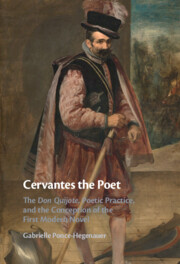 Cervantes the Poet
Cervantes the Poet Book contents
- Cervantes the Poet
- Cervantes the Poet
- Copyright page
- Dedication
- Contents
- Figures
- Acknowledgments
- Note on Abbreviations, Translations, and Terms
- Introduction The Unknown History of the Conception of the Don Quijote
- Chapter 1 Mimesis in the Court of Gentlewomen: The Pastoral Fabric of Everyday Life
- Chapter 2 Exalted Apostrophes: Cervantes in the Court of Isabel de Valois
- Chapter 3 Figura of the Poet: Pastoral Petrarchism as the Practice of Ingenious Gentlemen
- Chapter 4 The Form of Beauty: Lyric Lovers in the Mediterranean World
- Chapter 5 The Poet as Literary Character: Eclogues and Encomia in Madrid
- Chapter 6 The Literary Character as Poet: Lyric Subjectivity, Chronotopic Dynamism, and Plot in the Galatea
- Coda Alonso Quijano’s Lyric Subjectivity:
- Index
Chapter 3 - Figura of the Poet: Pastoral Petrarchism as the Practice of Ingenious Gentlemen
Published online by Cambridge University Press: 11 May 2023
- Cervantes the Poet
- Cervantes the Poet
- Copyright page
- Dedication
- Contents
- Figures
- Acknowledgments
- Note on Abbreviations, Translations, and Terms
- Introduction The Unknown History of the Conception of the Don Quijote
- Chapter 1 Mimesis in the Court of Gentlewomen: The Pastoral Fabric of Everyday Life
- Chapter 2 Exalted Apostrophes: Cervantes in the Court of Isabel de Valois
- Chapter 3 Figura of the Poet: Pastoral Petrarchism as the Practice of Ingenious Gentlemen
- Chapter 4 The Form of Beauty: Lyric Lovers in the Mediterranean World
- Chapter 5 The Poet as Literary Character: Eclogues and Encomia in Madrid
- Chapter 6 The Literary Character as Poet: Lyric Subjectivity, Chronotopic Dynamism, and Plot in the Galatea
- Coda Alonso Quijano’s Lyric Subjectivity:
- Index
Summary
Chapter 3 explores how an exemplary amorous biography, a type of vita poetica or literary hagiography, was attributed to el divino Francesco Petrarch over the course of the sixteenth century. Imitatio applied not only to the figures and tropes of the Trionfi and Canzoniere, but also to the figura of the poet as a model or exemplar for the life of an author. After roughly two centuries (1374–1575), Petrarch’s lasting fame became literary immortality like that of ancient authors (Homer and Vergil). From the 1535 alleged rediscovery of Laura’s grave and Alessandro Piccolomini’s 1540 pilgrimage to Petrarch’s tomb, to the various sixteenth-century translations of Petrarch’s poetry, and commentaries made by lyric poets in the front matter to publications, in manuscript poems, and in pastoral fiction, the literary afterlife of the figura of the poet took shape. This chapter reconstructs the figura of the poet as it was imagined, articulated, imitated, and reinvented by sixteenth-century poets writing in Castilian. By the middle of the sixteenth century the Castilianized ingenio (ingenium) had come to define the figura of the poet. This chapter fills in a lacuna (Garcilaso to Góngora) of roughly sixty years which is crucial to Cervantes’ work and studies of early modern poetics.
Keywords
- Type
- Chapter
- Information
- Cervantes the PoetThe <i>Don Quijote</i>, Poetic Practice, and the Conception of the First Modern Novel, pp. 81 - 111Publisher: Cambridge University PressPrint publication year: 2023


